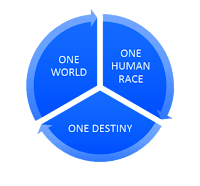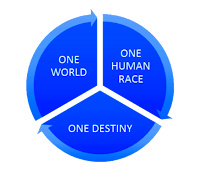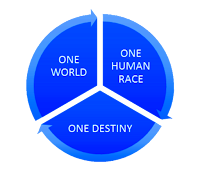RASTA, YOUR GOD IS DEAD, BUT THEN, ARE NOT ALL GODS DEAD?
And so it was, that, following the death of His Imperial Majesty, Haile Selassie, that some people might have said of the Rastafarians, Rasta, your god is dead!
The basis of that assertion would have been that, with the death of the Emperor of Ethiopia, which, like Egypt, has a great resonance for Africanists, his 'deified' representation had been removed. His death would have meant that the Rastafarians no longer had 'a living god', or 'god-like' figurehead whom they could worship or address their rituals to. Unlike the Jewish people, the Christians and the Muslims, to site but a few of the religions purportedly worshipping 'a living god.'
And yet, with some reflection, it is worth asking the question: Are not the gods of all religions that profess to worship 'a living god', also, all dead? Is the Christian God not dead? Is the Muslim God, Allah, not dead? Is the God of the Jews not also Dead?
If they are not all dead, as the former Emperor of Ethiopia is dead, then, were are they? Unlike the late Emperor, of whom we have not heard, and do not expect to hear from, why are the gods of their 'theistic' religions so quiet? Why do they not speak to us, probably to reassure us, except by way of those purporting to be their disciples and prophets, so loudly quiet over all the past centuries and millenniums?
I would contend that, the 'living gods' are, in fact, no different from the 'pagan gods.' Both kinds only exist and live in the minds and paraphernalia of their devotees. Without their devotees, they have no 'life', no separate existence from that of their devotees. If the devotees were to disappear or to stop believing, then their gods would no longer exist.
Indeed, I see a certain similarity between an inventor inventing and building a robot and programming it to carry out certain specific functions, and the 'living gods' of us humans. The inventor, by programming the robot, empowers it, and, providing it is supplied with the appropriate energy, it will carry out those functions.
Where the robot differs from the gods - purported 'living' or pagan gods - is in the fact that the robot is able to demonstrate its 'power', by actually performing the tasks it has been programmed to carry out. In the case of the gods of us humans, they have not been able to perform any of the tasks or functions they are said to be capable of carrying out. Except, through the unverified actions of the believers.
In all cases, when it comes to the gods of humans demonstrating their purported powers, humans are invited to suspend their 'disbelief', to deceive or allow ourselves, or accept the 'say so of the prophets, the disciples, the visionaries, or the priesthood.' For whatever reason/s, the gods of humans have chosen to act through intermediaries whose authenticity cannot be confirmed, even by way of mysteries.
Thus my contention that both the purported 'living gods' of the theistic humans, and the 'graven, but visible image' of the pagan gods, are of comparable quality and validity. Both kinds of gods cannot exist without their respective believers continuing to believe in them, as they do not have any existences outside of the belief systems in which they operate.
It is, indeed, a great mystery as to why, despite the lack of evidence of the 'living gods', humans have become so attached to the concept of them. That irrational behaviour should have become so indelibly 'normalised' and rooted into the minds and daily living of ordinary people.
Such is the mysteries of human evolution.










Comments